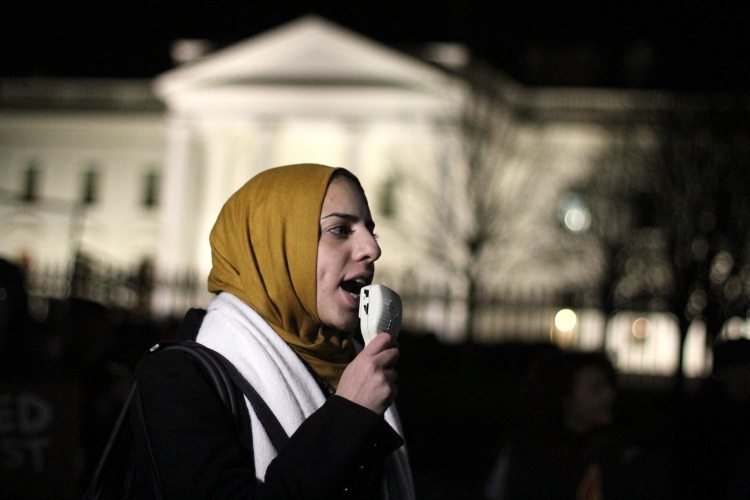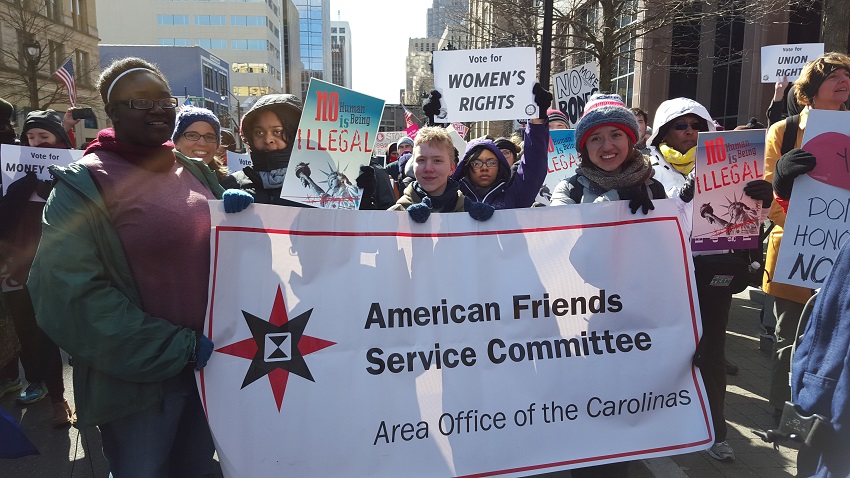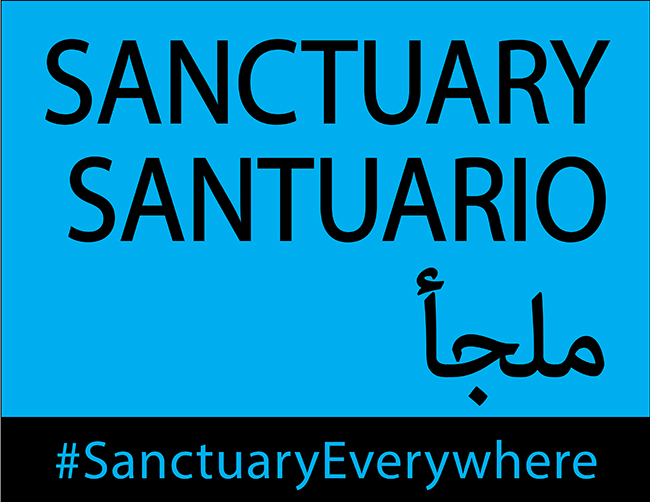
Standing against Islamophobia in DC AFSC
Note: This post introduces a thread of work under the title "#SanctuaryEverywhere". There will be a Call for Spirited Action on Thursday, January 12 at 8:30p.m. with Lori and others to explore more on this topic.
“Would you harbor me? / Would I harbor you? / Would you harbor me? / Would I harbor you? // Would you harbor a Christian, a Muslim, a Jew / a heretic, convict or spy? // Would you harbor a runaway woman, or child, / a poet, a prophet, a king? // Would you harbor an exile, or a refugee, / a person living with AIDS? …”
These words from a Sweet Honey in the Rock song have been haunting me for the last couple of months. I want to be a refuge to those who need it, but when it really comes down to it, who would I harbor? Who would my Quaker community harbor? What does it mean to keep someone safe? What does it mean for targeted communities to keep themselves safe?
Communities of color, religious minorities and LGBTQ individuals have already been targeted for years, and in North Carolina, protections have been significantly weakened in the last five years. The deportation machine that Donald Trump seems so ready to vigorously employ was created by President Obama. Yet, it seems clear that undocumented immigrants, refugees, Muslims, LGBTQ, and Black communities will be increasingly under attack during a Trump administration.
We are already seeing an impact. An undocumented friend of mine, I’ll call her Mary, has lived in North Carolina for more than 15 years. Her hardworking and talented husband wants to sell their house to have extra money in case they need to move back to Mexico quickly. A friend at a local mosque reports major feelings of anxiety and uncertainty about what’s to come, and about comments from schoolmates toward their children. What is my role with my friends?
For as long as there has been oppression, there have been movements of resistance and protection of targeted communities, like the Underground Railroad during slavery, Kindertransport during the Holocaust, and the protection of conscientious objectors during the Vietnam War. The Sanctuary Movement of the 1980s, led by faith communities, offered safe-havens to refugees fleeing war in Central America but who were unable to get asylum in the US. More recently, the New Sanctuary Movement and #Not1More campaigns have worked with individuals and families to protect them from deportation.

We don’t know yet what the coming attacks will look like, but we know what communities are already experiencing. In the month following the election, the Southern Poverty Law Center documented 1,094 hateful incidents, the majority of which were anti-immigrant, followed by anti-black incidents, then anti-Muslim, then anti-gay. We don’t know which policies may be enacted first, but we know what was promised in campaign speeches over the last year: mass deportations, a Muslim registry, the end of the Deferred Action program for young immigrants, stop-and-frisk policing targeting African American communities, and more.
In an environment in which the attacks may look different, what does Sanctuary look like? How do we create a community that protects many different targeted groups?
The American Friends Service Committee is starting a new initiative called #SanctuaryEverywhere to explore and identify ways to create safe/safer spaces wherever we are and whatever level people are ready to engage at. We know there already a lot of fantastic resources that already exist and we want to lift those up, like Sanctuary Not Deportation for congregations and Sanctuary Campus and Every Campus a Refuge for colleges. We recognize that we must take the lead from directly impacted communities, and find ways for allies to engage on many different levels. We will start out by creating a “one-stop-shop” website with lots of resources for whatever level of action you are ready to engage in. Eventually, we hope to equip thousands of people across the country with tools and training to interrupt hateful acts and government actions that put our communities at risk, and to encourage the adoption of concrete policies & practices that create greater safety and a welcoming environment for all.

#SanctuaryEverywhere is inherently intersectional, or in less jargony terms: “your struggle is my struggle.” We believe that we are all in this together and that we must ensure that all residents of our community are safe, welcomed and included by:
- Welcoming immigrants & refugees
Working to halt deportations to keep families together, and interrupting police and local collaboration with immigration authorities - Standing with Muslim and Jewish communities
Protecting all targeted religious groups from attacks - Supporting the Movement for Black Lives
Interrupting anti-Black violence and the “War on Black People”, including stop and frisk policing - Protecting LGBTQ North Carolinians
We believe that you can work to create a welcoming, inclusive and safer environment wherever you are. Here are some examples of the kinds of resources we hope to offer:
Individual, Family, Neighborhood
- Interrupting hateful speech or violence
- Accompanying a targeted individual in their daily errands
- Attending a “Crisis Scenario Community Response” training to practice how to respond to hateful acts
- Holding #SanctuaryEverywhere conversations in your neighborhood
Institutional (School, Campus, Church)
- Creating institutional policies that ensure safety for campus residents
- Training colleagues in how to create a safe space at work
- Creating a team at your child’s school to ensure all children are safe at school
- Holding Know Your Rights trainings at your Mosque or community center
- Sheltering of individuals or families
City/State
- Working with your City Council to ensure that the rights of all residents are protected.
- Strengthening our communities to prepare for further attacks
Sometimes I hear people say, “If I was alive during the civil rights movement, I would have been marching with Dr. King!” This is our moment now. What will you do?
Join Lori and others on a Call for Spirited Action about #SanctuaryEverywhere on January 12th at 8:30p.m.
Related Content:
Keep these families together: Denver Quakers provide sanctuary
After 9 months in sanctuary, Arturo Hernandez is going home
3 ways you can change the conversation on immigration on Facebook